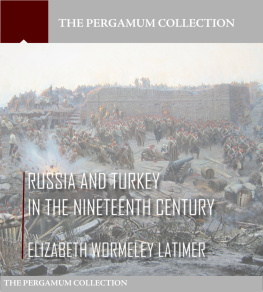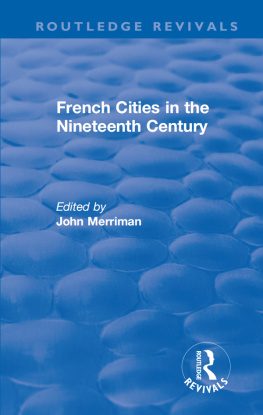Elizabeth Wormeley Latimer - France in the Nineteenth Century
Here you can read online Elizabeth Wormeley Latimer - France in the Nineteenth Century full text of the book (entire story) in english for free. Download pdf and epub, get meaning, cover and reviews about this ebook. year: 2019, publisher: Creative Media Partners, LLC, genre: Non-fiction. Description of the work, (preface) as well as reviews are available. Best literature library LitArk.com created for fans of good reading and offers a wide selection of genres:
Romance novel
Science fiction
Adventure
Detective
Science
History
Home and family
Prose
Art
Politics
Computer
Non-fiction
Religion
Business
Children
Humor
Choose a favorite category and find really read worthwhile books. Enjoy immersion in the world of imagination, feel the emotions of the characters or learn something new for yourself, make an fascinating discovery.

- Book:France in the Nineteenth Century
- Author:
- Publisher:Creative Media Partners, LLC
- Genre:
- Year:2019
- Rating:4 / 5
- Favourites:Add to favourites
- Your mark:
- 80
- 1
- 2
- 3
- 4
- 5
France in the Nineteenth Century: summary, description and annotation
We offer to read an annotation, description, summary or preface (depends on what the author of the book "France in the Nineteenth Century" wrote himself). If you haven't found the necessary information about the book — write in the comments, we will try to find it.
France in the Nineteenth Century — read online for free the complete book (whole text) full work
Below is the text of the book, divided by pages. System saving the place of the last page read, allows you to conveniently read the book "France in the Nineteenth Century" online for free, without having to search again every time where you left off. Put a bookmark, and you can go to the page where you finished reading at any time.
Font size:
Interval:
Bookmark:

EMPEROR NAPOLEON I.
IN
THE NINETEENTH CENTURY
| CHAPTER | |
|---|---|
| I. | CHARLES X. AND THE DAYS OF JULY |
| II. | LOUIS PHILIPPE AND HIS FAMILY |
| III. | LOUIS NAPOLEON'S EARLY CAREER |
| IV. | TEN YEARS OF THE REIGN OF THE CITIZEN-KING |
| V. | SOME CAUSES OF THE REVOLUTION OF 1848 |
| VI. | THE DOWNFALL OF LOUIS PHILIPPE |
| VII. | LAMARTINE AND THE SECOND REPUBLIC |
| VIII. | THE COUP D'TAT |
| IX. | THE EMPEROR'S MARRIAGE |
| X. | MAXIMILIAN AND MEXICO |
| XI. | THE EMPEROR AND EMPRESS AT THE SUMMIT OF PROSPERITY |
| XII. | PARIS IN 1870,AUGUST AND SEPTEMBER |
| XIII. | THE SIEGE OF PARIS |
| XIV. | THE PRUSSIANS IN FRANCE |
| XV. | THE COMMUNE |
| XVI. | THE HOSTAGES |
| XVII. | THE GREAT REVENGE |
| XVIII. | THE FORMATION OF THE THIRD REPUBLIC |
| XIX. | THREE FRENCH PRESIDENTS |
| XX. | GENERAL BOULANGER |
CHARLES X
LOUIS PHILIPPE, DUKE OF ORLEANS
DUCHESSE DE BERRY
QUEEN MARIE AMLIE
LOUIS PHILIPPE, "THE CITIZEN KING"
ALPHONSE DE LAMARTINE
LOUIS NAPOLEON, "THE PRINCE PRESIDENT"
DUC DE MORNY
EUGNIE
EMPEROR MAXIMILIAN
EMPEROR NAPOLEON III
EMPRESS EUGNIE
JULES SIMON
JULES FAVRE
MONSEIGNEUR DARBOY, ARCHBISHOP OF PARIS
PRESIDENT ADOLPH THIERS
LON GAMBETTA
COMTE DE CHAMBORD
PRESIDENT JULES GRVY
PRESIDENT SADI-CARNOT
GENERAL BOULANGER
IN THE
NINETEENTH CENTURY.
Font size:
Interval:
Bookmark:
Similar books «France in the Nineteenth Century»
Look at similar books to France in the Nineteenth Century. We have selected literature similar in name and meaning in the hope of providing readers with more options to find new, interesting, not yet read works.
Discussion, reviews of the book France in the Nineteenth Century and just readers' own opinions. Leave your comments, write what you think about the work, its meaning or the main characters. Specify what exactly you liked and what you didn't like, and why you think so.





